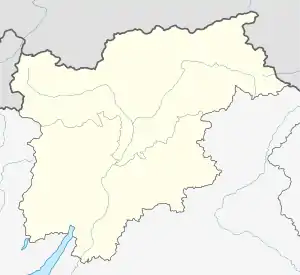Graun im Vinschgau
La Carun | |
|---|---|
| Gemeinde Graun im Vinschgau Comune di Curon Venosta | |
 | |
 Coat of arms | |
Location of Graun im Vinschgau | |
 Graun im Vinschgau Location of Graun im Vinschgau in Italy  Graun im Vinschgau Graun im Vinschgau (Trentino-Alto Adige/Südtirol) | |
| Coordinates: 46°48′N 10°32′E / 46.800°N 10.533°E | |
| Country | Italy |
| Region | Trentino-Alto Adige/Südtirol |
| Province | South Tyrol (BZ) |
| Frazioni | Langtaufers (Vallelunga), Reschen (Resia), St. Valentin (San Valentino alla Muta) |
| Government | |
| • Mayor | Franz Alfred Prieth |
| Area | |
| • Total | 210.5 km2 (81.3 sq mi) |
| Elevation | 1,520 m (4,990 ft) |
| Population (January 2011)[2] | |
| • Total | 2,447 |
| • Density | 12/km2 (30/sq mi) |
| Demonym(s) | German: Grauner Italian: curonesi |
| Time zone | UTC+1 (CET) |
| • Summer (DST) | UTC+2 (CEST) |
| Postal code | 39020 |
| Dialing code | 0473 |
| Website | Official website |
_repositioned_graveyard.jpg.webp)
Graun im Vinschgau (German pronunciation: [ˈɡraʊn ɪm ˈfɪnʃɡaʊ]; Italian: Curon Venosta [kuˈroɱ veˈnɔsta]; Romansh: La Carun) is a comune (municipality) and a village in South Tyrol in northern Italy, located about 70 kilometres (43 mi) northwest of Bolzano, on the border with Austria and Switzerland.
Geography
At 1 January 2011, it had a registered population of 2,447 and an area of 210.5 square kilometres (81.3 sq mi).[3]
The municipality contains the subdivisions Langtaufers/Vallelunga, Reschen/Resia, Rojen/Roja and Sankt Valentin auf der Haide/San Valentino alla Muta.
Adjacent municipalities: Mals, Kaunertal (Austria), Nauders (Austria), Pfunds (Austria), Sölden (Austria), Ramosch (Switzerland), Sent (Switzerland), and Tschlin (Switzerland).
The village of Graun borders the Reschensee, which was massively deepened and extended when the valley was dammed in order to produce hydro-electricity. The original village was flooded after the dam's completion in July 1950; it had been abandoned and largely demolished, and Graun was rebuilt on the new shore. As the lone exception, the bell-tower of the 14th-century church was spared from destruction. The tower protrudes above the surface close to the shoreline and has become a landmark; it is the centrepiece of the commune's coat of arms. When water levels fall in the spring, particularly when repairs are made, the ruins of the old village are exposed.[4][5]
History
In 15 BC the Celtic people then living in the upper Vinschgau valley found themselves incorporated into the Roman Empire following the construction of a commercial and military route crossing the Alps via what is now known as the Reschen Pass, the route then being called the "Via Claudia Augusta".
The transalpine route retained its importance through the medieval period, being variously called the "Upper Way" (Oberer Weg / Via Superiore) or the "Swabia Road" (Schwabenweg / Via di Svevia).
After 450, a wave of Christian missionaries arrived from Chur. By the time of the Black death (1348), from which most of the population of the time died, most of the Vinschgau Valley, including Graun, had been settled by German speakers; the exception being the side valley of Müstair, where the Romansh language survives to this day. German has remained the majority language in Graun since and as of 2011 German was the first language for more than 97% of its population.
Coat-of-arms
The escutcheon is party per fess, azure on the bottom and argent on the upper part, separated by a thin vert stripe. At the center is shown a gray bell tower, with three windows and an azure point, representing the church bell tower still visible in the lake after the construction of the dam. The emblem was granted in 1967.[6]
Society
Linguistic distribution
According to the 2011 census, 97.34% of the population speak German and 2.66% Italian as first language, a ratio that had hardly moved since the 2001 census.[7]
Demographic evolution

Transportation
The municipality is served by public bus. Destinations include Mals to the south; and Nauders, Austria; and Martina, Switzerland, to the north.
In popular culture
The supernatural drama television series Curon was primarily shot in the town and the surrounding locations.
References
- ↑ "Superficie di Comuni Province e Regioni italiane al 9 ottobre 2011". Italian National Institute of Statistics. Retrieved 16 March 2019.
- ↑ "Popolazione Residente al 1° Gennaio 2018". Italian National Institute of Statistics. Retrieved 16 March 2019.
- ↑ All demographics and other statistics: Italian statistical institute Istat.
- ↑ "Lost village emerges from Italian lake", BBC News, 18 May 2021.
- ↑ "Verwunderung in Graun", Die Neue Südtiroler Tageszeitung, 20 May 2021 (in German).
- ↑ Heraldry of the World: Graun im Vinschgau
- ↑ "Volkszählung 2011/Censimento della popolazione 2011". Astat Info. Provincial Statistics Institute of the Autonomous Province of South Tyrol (38): 6–7. June 2012. Retrieved 2012-06-14.
External links
![]() Media related to Graun im Vinschgau at Wikimedia Commons
Media related to Graun im Vinschgau at Wikimedia Commons
- (in German and Italian) Homepage of the municipality
